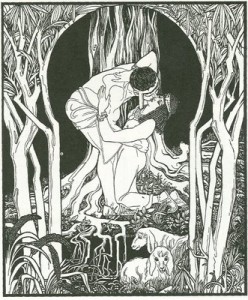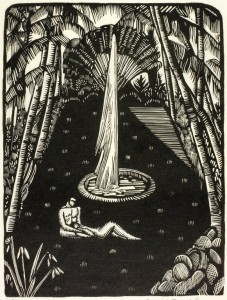14 Aug 2012
Holy of Holies: Returning to Eden 4 – Song of Songs, Celebrating Sex & Egalitarian Women
Author: Bobby Valentine | Filed under: Contemporary Ethics, Exegesis, Hebrew Bible, Marriage, Preaching, Sexuality, Song of Songs “Sex becomes a search. A search for something we are missing. A quest for the unconditional embrace. And so they go from relationship to relationship. The search is about that need.
“Sex becomes a search. A search for something we are missing. A quest for the unconditional embrace. And so they go from relationship to relationship. The search is about that need.But sex is not the search for something that’s missing. It is the expression of something that’s been found. It’s designed to be the overflow, the culmination of something that a man and a woman have found in each other. It’s a celebration of this living, breathing thing that’s happening between the two of them.” (Rob Bell, Sex God, p. 123)
“KISS ME, make me drunk with your kisses!
Your sweet lovemaking is better than wine.
You are fragrant, you are myrrh and aloes.
All the young women desire you.”
(1.2-3, my translation)
Links to Previous Studies in this Returning to Eden Series
1 – Song of Songs, Sexuality & Spirituality
2 – Song of Songs and the History of Denying Sexuality
3 – Song of ALL Songs or Just a Silly Little Love Song?
Celebrating Sex!
Modern Evangelical, and “Church of Christ” Christians, have often imbibed a worldview that is on many counts not simply unbiblical but anti-biblical. As noted in the second of these studies (see Song of Songs and the History of Denying Sexuality) in the second and third centuries Christianity drunk deeply from the Platonic culture surrounding it. This influence is seen in two ways: 1) the Gnostic rejection of creation and the Jewish Creator god with its denial of the goodness of that creation; 2) the denigration of sexuality, sexual urges, and the denigration of women as the agents of Satan for tempting men. Sex became a “necessary evil” for the propagation of the race. The Song of Songs was a clear problem. To fix that perceived problem allegory was resorted too.
Plato, in his Symposium, has Socrates waxing eloquently on the status of “love” (for the non-Greek reader the love in the Symposium is eros). At the end Socrates offers the highest form of “eros” in which we get our notion of “platonic love” from. None of the love(s) celebrated in the Symposium is remotely like the biblical notion. Women for Plato were worse than the animals (he says so in another Socratic dialogue Timaeus). The greatest love was the pursuit of wisdom as understood by Plato. The appetites of the body were to be denied for that pursuit … indeed in Platonic salvation the “immortal soul” would one day be set free from the cage of the degrading body.
Modern Christians have, even unawares, often reflected that Platonic outlook. Even as the rest of the world has become “liberated” so to speak the church has remained Victorian. To associate Sexuality and Spirituality is virtually unheard of. The impression that is granted to the world and even to many of our own members is that sex is tolerated (even though everyone does it!) but it is not to be celebrated as a good in itself. And it is a faux paux to let others know you actually enjoy it!
How different is the Hebraic worldview from that of many in modern Evangelical Christianity. The Proverbs declare
Let your fountain be blessed,
and rejoice in the wife of your youth,
a lovely deer, a graceful doe.
May her breasts satisfy you at all times
may you be intoxicated always by
her love!
(Proverbs 5.18-19, BV)
The worldview of Song of Songs is not confined to the Song. Rather the worldview of Song of Songs is the worldview of ancient Israel. The vision of Israel, expressed in the Song of Songs is the redemption of relationships. Rather than being antagonistic to humanity as Gen 3 prophesies, creation is the setting for shalom in the Song for the love of the couple that is as unabashed as in the Garden.
If we believe in the canon of Scripture then the Holy Spirit is not shy about sex. Sexuality is a dominant theme in the Song. It oozes sexuality! This is sometimes obscured because of our Platonic lenses and unhappy English translations. The Hebrew word ‘ahaba is a word that means love. We read in Song of Songs 7.6 (v.7 in Hebrew)
mah yapit u-mah na’amt ‘ahabahba-ata’anugim
How splendid and how sweet you are, O Love among [all] the delights!
Love is an abstract noun here. But ‘ahaba is a fairly rare word in Song of Songs. But even in 7.6 it is the woman’s physical charms that elicit such an exclamation. But the word that dominates Song of Songs from the vocabulary of “love” is dodim. We encounter this word in the second verse of the book quoted above where I rendered it “lovemaking.” The root dd occurs a total of 36 times in Song of Songs. That this word is explicitly sexual in nature we need only read Proverbs 7.18,
Come, let us take our fill of love until morning;
let us delight ourselves with love. (NRSV)
Or the explicit Ezekiel 23.17
And the Babylonians came to her into the bed of love, and they
defiled her with their lust … (NRSV)
Though the word may be rendered “love” in Hebrew it is always sexual love. For other examples of dodim in Song of Songs see 1.2, 4; 4.10; 5.1; 7.13; etc [1]
Here a biblical book literally begins with a description of sexual desire and it is boldly stated.
Hers. The Song of Songs has dialogue present between the woman and the man: the woman and the daughters of Jerusalem, and the woman and the night guards. The distribution of this dialogue is far from equal. The woman is far and away the primary speaker approximately 70 percent of the words coming from her mouth. The woman is the primary “actor” in the book.
It is true the man does speak his praise for her in 1.9-11, 15; 2.2; 4.1-7; 6.4-9 and 7.2-10. Yet he disappears (as far as a voice is concerned) completely in chapter 8. Even when he comes to “his garden” it is only at her invitation (4.16-5.1a).
This woman is no passive lady! She does not let him set the agenda so to speak. For example she outdoes his praises for her by bragging on him (1.16-17; 2.3). She begins the Song and she ends the Song. She is the one who speaks the Songs refrains. She is the one who calls on her lover to do things – draw her after him (1.4), be like a gazelle (2.17), to come out to the fields with her (7.12-14), set her as a seal on his arm (8.6) and to flee with her (8.14). She seeks him (1.7). She “seizes” him to bring him into the chamber of love (3.4 & 8.1-2). She is such a powerful presence that in the middle of the Song he confesses to be driven mad by just one of her glances, with but one strand of her necklace (4.9)!!
She is hardly shy or even “polite” about her public praises of her man. She is not “embarrassed”. Her friends, perhaps tired of her continual bragging about his traits, finally say exasperation (5.9)
mah dodek mi(n)-dod se-kakah hisba’tanu
What’s so special about your lover, that you make us swear in this way?
This is not a private conversation the woman is having. She boldly declares “He Rocks!!” Of course that is a loose paraphrase but it captures the meaning quite well. She responds to her “critics” with a gushing report on his uniqueness. To these friends/critics(?) she mentions his gorgeous head (v.11), his eyes (v12), his facial features (v.13), how she loves his puckered lips (v.13b), how hot his body is (v.14b), his legs and voice (vv.15-16). Finally she declares he is simply her “friend” (v.16b). Such discourse was proper for God’s People in Israel. One can hear Plato and the Victorians groaning … and perhaps not a few church people too! She repeats this public praise of her man to the watchmen.
To say that Song of Songs smolders with sensuality is to make the proverbial understatement. But here is the reality of the situation. This is how God desires our love to be! In the song mutuality is the atmosphere that is breathed between the man and the woman. She is not a passive entity but is the driver behind the entire book.
 His. The man is not as articulate in the Song as the woman. However he is not shy about saying things about his isha. In chapter 4.1-7 he erupts like a volcano about her. He unashamedly celebrates (as God directs in Proverbs) the “goods” of his “babe.” The poetry is exquisitely graceful. It is sensuous and replete with erotic imagery and allusions and wonderful word plays. Here is a man who had indeed savored his woman and become “intoxicated” (to use Proverbs 5.18f). He begins with the particle hinneh (2x!). He says
His. The man is not as articulate in the Song as the woman. However he is not shy about saying things about his isha. In chapter 4.1-7 he erupts like a volcano about her. He unashamedly celebrates (as God directs in Proverbs) the “goods” of his “babe.” The poetry is exquisitely graceful. It is sensuous and replete with erotic imagery and allusions and wonderful word plays. Here is a man who had indeed savored his woman and become “intoxicated” (to use Proverbs 5.18f). He begins with the particle hinneh (2x!). He saysWow! You are so beautiful, my love
Wow! You are so beautiful! (4.1)
The man is literally arrested at this moment – stopped in his tracks – by what he perceives to be her beauty [2]. She is not just any beautiful woman but his. He takes delight in her beauty. Twelve times in the Song her beauty (Heb, yapa) is proclaimed (1.8; 15 [2x]; 2.10, 13; 4.1[2x], 7; 5.9; 6.1, 4, 10). What the man’s poem revels in is the beauty, the allure, sensuality, and delight he has for his woman’s body. He even praises her breasts no fewer than four times (4.5; 7.3, 7-8. they are mentioned a total of 8x in the Song, 1.13; 4.5; 7.3, 7-8; 8.1, 8, 10).
This last point is more important than we might think. I find this “naked” admiration of the “Shulammite’s” physical beauty refreshing. It reminds us that at the bottom God has created us as embodied creatures, biological creatures. Our bodies Matter! How anti-Platonic and anti-Gnostic. The man’s admiration of his woman’s body leads to the valuation of her [3].
Wrapping Up For Today
The Song of Songs is powerful medicine in the Word of God for the warped views regarding sexuality both in and out of the church. The Jewish worldview that God created us and made us by intent to be creatures in relationship – even intimate ones – is foundational. The Song is the antidote to perversions of Sexuality whether that is asceticism or what might be called the Porn world.
Sexuality is more than sexual intercourse but intimacy is celebrated as wholesome before God. In the Song sex is good in and of itself. It is not justified on the grounds of procreation but for delight and pleasure.
The Song reminds us of what God had longed for in the Garden of Eden. In our marriages we can participate in and mirror a world that is creational and even redeemed. The Song gives a balanced relationship between the sexes. In our culture in which wives are often treated more as property than partners, the woman is shown here by the Spirit’s intent as the more active partner. It is an egalitarian relationship that exists in this relationship.
The Song has to be used to become effective in counter acting the corrosive effects of a history of misapplication in Christianity. We must become comfortable in reading the book. In our own relationships we should “practice” using exotic metaphors to communicate the wonders and uniqueness of our spouse. What a gift.
A Related Article
Notes:
1] For more on dodim see Daniel Grossberg, “Nature, Humanity, and Love in Song of Songs,” Interpretation(2005), 229-242.
2] See the excellent article by F. W. Dobbs-Allsop, “The Delight of Beauty and Song of Songs 4.1-7,” Interpretation(2005), 261-277, especially p. 262.
3] See the delightful discussion of this and similar “flavors” in Carey Ellen Walsh, Exquisite Desire: Religion, The Erotic and the Song of Songs (Fortress Press, 2000), 105-132.


August 15th, 2012 at 1:28 am
“What the man’s poem revels in is the beauty, the allure, sensuality, and delight he has for his woman’s body. He even praises her breasts no fewer than four times (4.5; 7.3, 7-8. they are mentioned a total of 8x in the Song, 1.13; 4.5; 7.3, 7-8; 8.1, 8, 10).”
One of the things that struck me about this element of the Song is the fact that the lady isn’t particularly “well-endowed” in this department (8:8) and her brothers actually fear that no man will find her attractive enough because of it. But the groom loves her for who she is, exactly as she was created. It’s a testament to the purity of this song. There’s no demeaning and objectifying comparing of bodies to some idolized “ideal type.” The sexual desire starts with a holy love that radiates and purifies everything around it.
August 15th, 2012 at 2:07 am
You should link to “The Ship Song”
August 15th, 2012 at 4:31 am
John I don’t know the Ship Song. I will have to look it up.
August 15th, 2012 at 4:34 am
Anon I dont normally let anonymous statements fly but yours is excellent. It is a very good point. The Song is patently sexual but it is a deeply passionate but holy love. Like the “flame of Yah[weh]” itself.
August 15th, 2012 at 1:52 pm
I believe you and Anon might be misinterpreting 8.8. That is not the wife but the wife’s younger sister. It is the wife going to her love and seeking advice from him. Her “breasts” are mentioned to show her young age…..
Actually the wife it seems was well endowed.
“I was a wall, and my breasts were like towers; then I was in his eyes as one who finds peace.”
Just a suggestion.
August 15th, 2012 at 4:25 pm
Don. Honored to have you reading along. I agree and disagree with you. There is no evidence to support the idea that the woman mentioned in 8.8 is not the same primary character throughout the Song.
The NIV most unhelpfully labels these verses under “Friends” … they are not they are her Brothers. But the speaker of the verses is the woman herself quoting them – this is the consensus of the commentaries at my disposal and looking at the text I agree with that understanding.
But the comment on her small breasts has two possible meanings 1) they are literally small and thus she is not “mature” yet or 2) the brothers are being what many brothers have been in the past – simply being jerks.
From not only v.10 – also the woman speaking – we seek that either way the woman does not agree with her brothers (i.e. she has a mind of her own). If the comment is a literal comment on the size of her breasts in v.8 she does not let that affect her self-image … and btw it does not affect her man’s image of her breasts – he loves them!! But I lean towards the notion that the brothers are simply being idiots and she is asserting her self-worth in face of stupid criticism. Her breasts are lovely both to her and her man and in the final analysis that is all that matters in the Song. Blessings.
August 15th, 2012 at 9:13 pm
I received this comment about this series on SofS and obtained permission to place it here on my blog. I found it enlightening … we need to preach the Old Testament/Hebrew Bible brothers & sister … we need to preach the Song of Songs IT IS THE WORD OF GOD. Do we disrespect his Word???? Are we embarrassed by his Word?? Here is the comment …
“Bobby, thanks for your series on the Song of Solomon. The closest I got to teaching from the book was an article or two in our bulletin in the 80’s. I discussed it with one of the elders about having a class on it. His comment was that God never meant for it to be read publicly but only privately. I asked him where that was taught. End of conversation! I’m 75 and been preaching since 1954 and I have never heard a lesson from the pulpit in the book. Sad to say, many women in the church have been taught that sex is to be endured, not enjoyed. Perhaps that is the reason for the increase in divorces in the church in the past 3-4 decades.”
Signed by
MRH